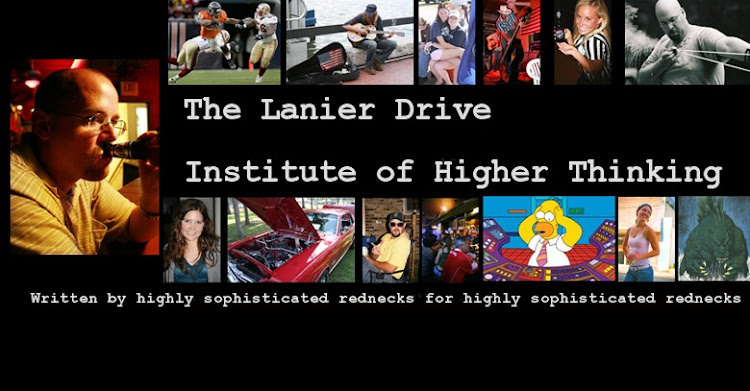Defining BS… er, PR
After the last War and Peace length piece, I thought it was time to frame the penultimate portion of my argument for moving Georgia Southern to the FBS by breaking my bit on the role of public relations into two parts and making things a little more succinct. I wanted to start by boiling down everything about public relations, so we could get right into talking about GSU in the second verse. So, here is my definition of PR:
Public relations – 1) The act of manipulating reality through the controlled spread of information; 2) an institutional gag reflex.
Anyone who tells you that definition is a gross oversimplification of a complex and multifaceted job probably works in P.R. or is getting a degree in P.R.
The reason anyone can break down PR into such easy-to-remember definitions is because when you apply the use of public relations to almost any situation—constructive, destructive, reflexive, informative, entrepreneurial, propagandistic—it is always about information and how that information is interpreted. Even a lack of information is open to interpretation.
The gag reflex part is just an example of PR as an institutional self-defense mechanism.
"Ms. Spears has voluntarily entered a rehabilitation facility…" You get the picture.
There are PR campaigns large and small all around Georgia Southern football, from boosters conducting fund raisers to coaches explaining the expulsion of troublesome players to lonely Internet geeks and former sports writers explaining ad nauseam their position on GSU's place in college football.
Effective PR campaigns shouldn't be judged by how much information they disseminate. Instead, the best PR in the world achieves high scores when the plausibility of the information works at a very high ratio of compatibility with the message that information tries to convey. For example, when President Bush announced that he wanted NASA to work toward a manned spaceflight to Mars a while back, the PR splash was initially good (the message was exciting to most people, or at least it stoked their imaginations), but the long-term viability of the story was weak. Lack of massive additional funding to NASA and continued problems in Iraq undermined the plausibility that the Mars announcement was anything more than a way to give a struggling president a brief bump in the polls. It doesn't matter what the truth was: perhaps George really, really wanted to get a man on Mars and the friggin' Democrats locked up all the funding proposals to make him look like a putz. At least the Dems' PR people had the good gag reflex to deflect criticism from themselves and get the American people thinking about gas prices and next door neighbors fighting in the desert. That message carried far more plausibility than the president's, which is again a simplification but is also a perfect way to measure the relative effectiveness of any PR campaign.
I'll get the theory to ring a little closer to home by rating five moments in GSU football history in terms of how they stack up as PR triumphs or failures. These are moments rated in terms of the public relations impact of the moment, not the overall effect on Georgia Southern football history:
Paul Johnson returns to GSU: Greatest public relations move in GSU football history.
The Message: Folks, GSU is about winning championships. After five years of above-average football but no new flags on the pole, Georgia Southern announced a return to its roots by hiring a tremendous football mind that also had ties to the Erk Russell era. In fact, the staff of this new coach was rife with old Russell assistants and even Erk's own son!
Plausibility: Anyone who could win at Navy was legit, and having Erk himself push Johnson's name to the top of the list made it even more so.
VanGorder is hired by GSU: A really good PR moment (at the moment).
The Message: Same as above, and despite not having the same ties to GSU's football past per se, being a former University of Georgia defensive coordinator gave BVG a tie to the Eagles' storied past that more than made up for his wooden demeanor at the initial press conference.
Plausibility: Other than being a journeyman coach with no real history of winning anything truly substantial (and don't give me this Sugar Bowl crap, either—since the BCS created a title game, all other bowls are just post-season exhibitions), BVG came with a really, really good pedigree. And if he lacked the charisma to really fire people up, so what. Even Johnson's "aw shucks" routine early in his GSU career was more endearing than motivating (although PJ scared the shit out of players immediately).
Erk is hired by GSU: Believe it or not, the perfect example of a PR "draw." The message was incredible, the plausibility of that message, however…
The Message: We're going to start a football program at Georgia Southern and we're going to play in Division I and we're going to win! Just Erk's name gave the program legitimacy it would have never had with almost anyone short of Vince Lombardi at the helm. It didn't hurt that Erk was coming off a championship season with the Georgia Bulldogs.
Plausibility: The school had to buy a K-Mart football for the press conference. Not good. Even Erk's wife thought he'd lost his mind. But then again, he was a really, really good coach. Then again, his last head coaching job was at Grady High School…
(Remember folks, we're evaluating these moments in terms of PR triumphs or failures at the time. We're not evaluating the historical outcomes. The greatest effect Erk had early on was spreading the word that GSC was actually going to start a program; adding Russell's name made it news in a way it would not have been otherwise.)
Everything BVG did after being hired: Straws on a camel's back.
The Message(s): (1)We are going to build a first-class program (2) The whole team will get better if we scrap the triple option (3) Yellow School buses don't project the image of class we need to attract top recruits (4) We'll do better than our opening-night effort (5) See, we beat Coastal—and they're good (6) We're just going through growing pains (7) See, we took App State to overtime (8) The kids just weren't focused (9) We're just going through growing pains (10) With that first year behind us, we can really start to build this program in the image we've been telling you about (11) No, seriously, the Falcons' job is really, really good!
Plausibility: (1) Sounds good (2) If you say so—that's why we're paying you the big bucks (3) Just as long as you haul 'em out for Homecoming (4) Get 'em next time, coach! (Under breath: "How much are we paying this guy?") (5) So did Wofford (6) That offense is what's painful (7) And then you lost (8) Isn't your job to get them focused? (9) I didn't hear you, I was at home painting the garage (10) What image? (11) Hey, guys, has anyone ever thrown a ticker-tape parade because someone left town?
Rusty Russell is fired by Georgia Southern: The big "oops."
The Message: We are so committed to GSU's winning heritage that even the son of our famous founder is not above being released after a horrible season by his defensive unit. Of course, we talked with Erk about all of this…
Plausibility: When Erk handed me a letter at Snooky's one morning a few weeks later detailing his utter disdain for the move and refuting the idea that he'd been in the loop about the firing, the message and the plausibility were suddenly completely at odds. Then the father of GSU football turned his back on the program. This, folks, is what a PR nightmare looks like in the textbook.
That's the first basic principle of public relations as taught at the Lanier Drive Institute of Higher Thinking—message to plausibility ratio. This is also known as "smelling bullshit"—when any institution, from a government to an aging rock star's publicist, releases a message that is so absolutely implausible that any right-thinking person in America cannot swallow that message.
The second principle is differentiation. This is an understanding that PR is just a message, not an act. When an institution does something or something happens to that institution, it is an act. How participants on both sides of the act (the pitchers and catcher, so to speak) try to explain/describe/ignore/etc. that act is the actual PR. See definition one above.
With that in mind, later this week, we'll talk about the PR surrounding the current I-A/I-AA debate from the viewpoint of three different institutions. Stay tuned.







|